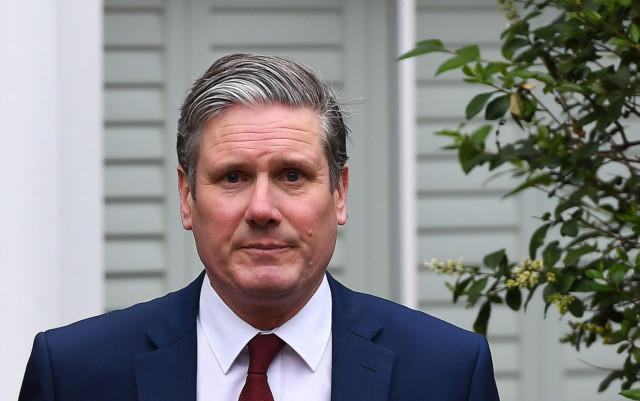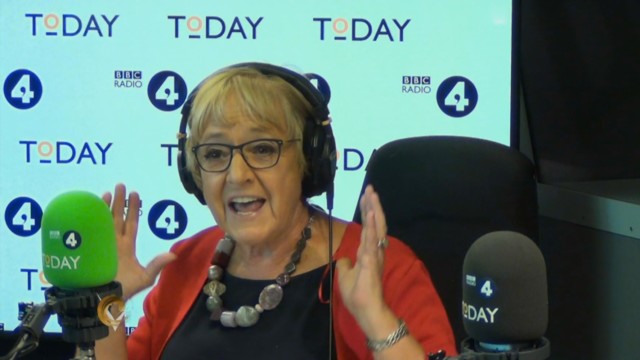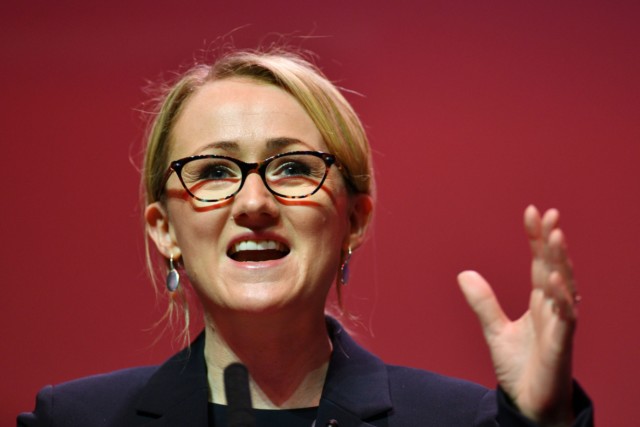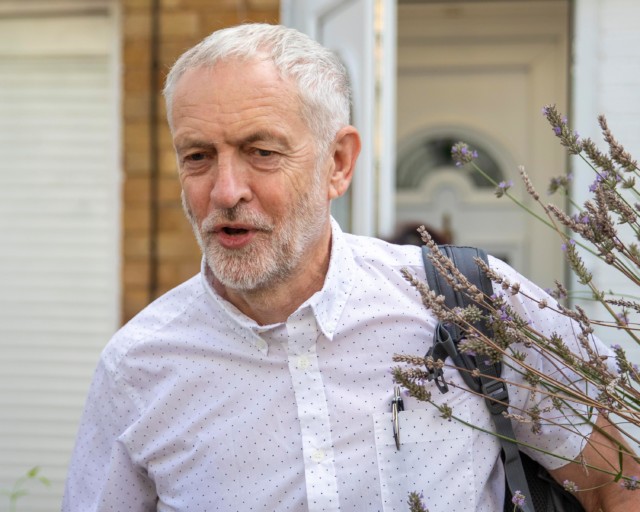THE LABOUR Party has become engulfed in yet another furious antisemitism row after Rebecca Long-Bailey was sacked for sharing a “conspiracy theory” online.
Long-Bailey’s sacking is the latest in a long line of antisemitism incidents to have dogged the party over the past few years, which culminated in Scotland Yard launching a criminal investigation into alleged hate crimes last year.
What is the Labour antisemitism row?
Since Mr Corbyn became leader in 2015, he has been dogged by critics claiming the party harbours antisemitic activists and campaigners among its membership.
Labour has come under fire over its handling of disciplinary action against members accused of making anti-Semitic remarks – such as Ken Livingstone, who was suspended for two years for claiming Hitler was a Zionist.
Naz Shah, the MP for Bradford West, also resigned as an aide to shadow chancellor John McDonnell after she was accused of sharing anti-Semitic graphics on social media.
In 2018 the Labour party was urged to adopt the International Holocaust Remembrance Alliance‘s (IHRA) definition of anti-Semitism, including the 11 examples of “contemporary anti-Semitism”.
The definition has been adopted by 31 countries as well as more than 130 UK councils, police forces, the Crown Prosecution Service and the judiciary.
But in July that year Labour’s ruling National Executive Committee voted to leave out some of the IHRA examples, sparking fury.
Labour claimed it wanted to protect freedom of speech, but it caused uproar with Jewish newspapers joining forces to condemn Labour’s “sinister” refusal to adopt the IHRA’s definitions in full”.
Corbyn faced a tough summer personally after he was pictured holding a wreath, apparently in a ceremony honouring terrorists who murdered Israeli athletes at the Munich Olympics.

And Labour veteran Margaret Hodge branded him “racist” in a stand-up row in the Houses of Parliament.
In February 2019 the party was thrown into crisis by the resignation of seven MPs who said Labour is “now racist and anti-Semitic”.
They included Jewish MP Luciana Berger, who has been bombarded with vile abuse by Corbyn supporters.
The Equality and Human Rights Commission launched an inquiry in May last year into claims the party became institutionally antisemitic under Jeremy Corbyn’s watch.
In November 2019, Chris Williamson was banned from standing to be an MP again, after he had the whip withdrawn and was booted out of Labour after saying the party had been “too apologetic” about antisemitism.
Why have the Met Police opened an investigation?
On November 2, 2018 Scotland Yard said it had launched a probe into alleged instances of anti-Semitic hate by Labour members.
Officers are examining an internal Labour dossier after it was handed to the force’s boss, and were considering whether to bring criminal charges against activists who had been accused of racism.
The dossier, apparently compiled by Labour officials, detailed 45 claims of anti-Semitic behaviour and was published by LBC in September.
The file included messages such as “We shall rid the Jews who are cancer on us all”.
Among the slurs allegedly spread by some Labour activists were “these Jewish f***ers are the devils” and calling supporters of Israel “Anglo-Zio-Nazis”.
Former deputy leader Tom Watson said news of the police probe was “thoroughly depressing”, but added: “Sadly, I’m not surprised.”
Early in 2020, Scotland Yard chief Dame Cressida Dick said police investigating alleged antisemitism had passed five files on to the Crown Prosecution Service.

What happened at the Labour NEC meeting?
In September 2018, NEC member Pete Willsman was re-elected to the ruling body despite a rant apparently accusing “Trump fanatics” of fabricating the antisemitism row.
The next day left-wing activists cheered Willsman as the NEC arrived for a crunch meeting aimed at bringing the crisis to an end.
After four hours of talks, committee members finally voted to adopt the IHRA definition in full.
The change to the party’s code of conduct could see members expelled for comments that fall foul of the 11 examples.
But Mr Corbyn was branded “contemptible” after it emerged he tried to add a statement saying it’s OK to call Israel fundamentally racist.
Instead the NEC voted to add a softer “free speech clause” meant to allow legitimate debate on Palestine.
Campaign group Labour Against Antisemitism said: “There can be no caveats, no conditions and no compromises with racism, and it is an ongoing disgrace that the Labour Party appears incapable of simply doing the right thing.”
What has Jeremy Corbyn said?
Jeremy Corbyn insists he is “not an anti-Semite in any form”. His supporters say he has spent his career opposing racism.
But he had admitted Labour had a “real problem” with anti-Semitism within the party and vowed he would “root out” any abuse.
He told Labour anti-Semites: “You are not my supporters and have no place in our movement.”
His comments came after a joint front page article by three Jewish newspapers said a Labour government under Corbyn would pose an “existential threat to Jewish life”.
Writing in The Guardian, he said: “I do not for one moment accept that a Labour Government would represent any kind of threat, let alone an ‘existential threat’ to Jewish life in Britain, as three Jewish newspapers recently claimed.
“That is the kind of overheated rhetoric that can surface during emotional political debates.”
Corbyn also launched a review into racism and anti-Semitism in the party.
What has Sir Keir Starmer said?
On winning the Labour Party leadership election, Sir Keir apologised for the “poisonous stain” of anti-semitism and vowed to root it out of the party.
He said: “Antisemitism has been a stain on our party. I have seen the grief that it’s brought to so many Jewish communities.
“On behalf of the Labour Party, I am sorry.
“And I will tear out this poison by its roots and judge success by the return of Jewish members and those who felt that they could no longer support us.”
What’s the latest?
Long-Bailey was sacked from the Labour front bench on June 25 after she shared an article which claimed the tactic of kneeling on someone’s neck – which killed George Floyd – was “taught by the Israeli army”.
Sir Keir said: “The sharing of that article was wrong because the article contained anti-semitic conspiracy theories and I have therefore stood Rebecca Long-Bailey down from the shadow cabinet.

“I made it my first priority to tackle anti semitism and rebuild trust with the Jewish community.”
In an interview with the Independent, actor Maxine Peake said that “The tactics used by the police in America, kneeling on George Floyd’s neck, that was learnt from seminars with Israeli secret services.”
The article says that a spokesperson for the Israeli police had denied this statement, saying “there is no tactic or protocol that calls to put pressure on the neck or airway”.
The article attracted attention after it was retweeted by the Shadow Education Secretary Rebecca Long-Bailey with the comment: “Maxine Peake is an absolute diamond”.
The sacked front-bench MP for Salford and Eccles was forced to clarify her comments, saying “I retweeted Maxine Peake’s article because of her significant achievements and because the thrust of her argument is to stay in the Labour Party.”
How the row unfolded
- February 2016: Labour MP John Mann calls a “full enquiry” into the Oxford University Labour branch after its club co-chairman resigned, saying many members “had some kind of problem with Jews”
- Jeremy Corbyn launches an inquiry into allegations of anti-Semitism and other forms of racism in the party
- April 2016: MP for Bradford West Naz Shah is accused of sharing anti-Semitic posts and is suspended from her role as John McDonnell’s parliamentary private secretary
- Ex London Mayor Ken Livingstone makes comments on BBC Radio London defending Shah, apparently claiming Adolf Hitler was a Zionist. He was suspended from the party for a year
- June 2016: Leading the enquiry, Shadow Attorney General Shami Chakrabarti concluded that while Labour was not overrun by anti-Semitism, there was an “occasionally toxic atmosphere”. She gave 20 recommendations to improve this
- July 2016: Shah is reinstated and blames “ignorance” for her posts
- September 2016: Corbyn appoints Ms Chakrabarti to the House of Lords, just three months after her enquiry
- April 2017: Livingstone’s suspension is extended for a further year
- September 2017: The Labour Party conference is marred by a number of allegations, including that pro-Corbyn activists applauded speakers who voiced anti-Semitic views
- In the same month, Corbyn backs a party rule change put forward by the Jewish Labour movement, that takes a tougher line on anti-Semitic abuse
- March 2018: Corbyn is accused of anti-Semitism after defending an East London mural depicting Jewish bankers playing monopoly on the backs of the poor
- April 2018: Political blogger Guido Fawkes reveals Corbyn marked Passover with Jewdas, a radical far-left Jewish group that calls for the destruction of Israel
- Corbyn-backing grassroots movement Momentum says Labour failed on anti-Semitism, and acknowledged the “upset and despair” of the Jewish community
- MPs stand in the House of Commons to attack Labour’s record on anti-Semitism
- Labour vows to settle anti-Semitism complaints by July with Corbyn saying dealing with complaints swiftly and fairly is a top priority for the party’s new general secretary
- Jeremy Corbyn accused of “shrugging” when urged to condemn Labour’s anti-Semites as meeting with Jewish leaders to diffuse crisis backfires disastrously
- May 2018: Oxford councillor Ben Lloyd-Shogbesan resigned from the Labour Party over a Facebook post comparing Israel to Nazi Germany.
- Ken Livingstone resigned from the Labour Party amid accusations of anti-Semitism, two years after he was suspended.
- July 18: Labour sparks outrage by launching disciplinary action against ex-minister Dame Margaret Hodge, the granddaughter of a Holocaust victim, who accused Mr Corbyn of racism in a House of Commons bust-up.
- July 23: Labour endorses the International Holocaust Remembrance Alliance (IHRA)’s definition of anti-Semitism – but leaves out four examples from the list, provoking uproar.
- July 29: Labour MP Ian Austin, the son of adoptive Jewish parents, lashed out at Corbyn for “supporting and defending” extremists and anti-Semites.
- August 11: A photograph emerged of Jeremy Corbyn holding a wreath at a ceremony in Tunisia in 2014 for terrorists who murdered 11 Israelis in the 1972 Munich massacre.
- August 13: Jeremy Corbyn admitted he was “present” at the ceremony but not “involved” with the actual wreath laying.
- August 23: A recording emerges of Jeremy Corbyn accusing British Zionists of having “no sense of English irony”.
- August 24: Labour MP Luciana Berger slams his comments as “inexcusable”.
- August 30: Veteran MP Frank Field resigns the Labour whip in protest at Mr Corbyn’s leadership of the “racist” party.
- September 4: Mr Corbyn was warned he would split the party in two if he didn’t get a grip on anti-Semitism. The NEC caved into pressure and voted to adopt the IHRA definition in full. Video emerged of Corbyn heaping praise on Hamas and thanking them for dinner.
- September 5: Ken Livingstone claims Labour’s anti-Semitism crisis is “absolutely” a conspiracy against Jeremy Corbyn
- November 2: Scotland Yard announces the Metropolitan Police have opened a formal probe into the alleged racist messages from Labour
- February 18, 2019: Seven Labour MPs quit the party to form breakaway group of independents, saying Labour is “now racist and anti-Semitic”. They included Jewish MP Luciana Berger, who has been bombarded with vile abuse by Corbyn supporters.
- February 22, 2019: MP Ian Austin quit the Labour Party over its “culture of extremism, antisemitism and intolerance.” The Member of Parliament for Dudley North, who is pro-Brexit, insists he will not be joining the newly formed Independent Group which is pushing for a second referendum.
- May 2019: The Equality and Human Rights Commission launches an inquiry into alleged antisemitism within the party
- November 2019: Chris Williamson is banned by Labour from standing to be an MP again
- January 2020: Five files are passed onto the CPS by police investigating the issue
- June 25, 2020: Long-Bailey is sacked from the front bench after she shared an article which contained an “antisemitic conspiracy theory”








